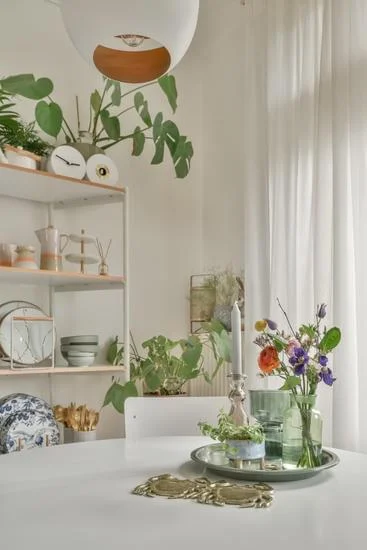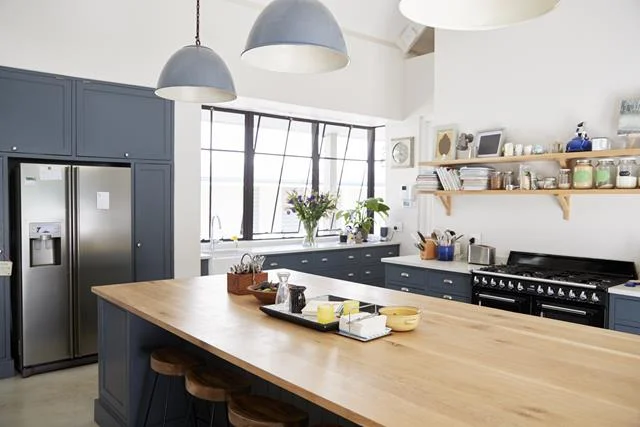Are you passionate about interior design and looking to turn your love for home decor into a successful business venture? In this article, we will guide you through the essential steps on how to open a home decor business. From identifying your niche and understanding your target market to navigating legal requirements and establishing your brand, we have got you covered.
The home decor industry is a booming multi-billion dollar market that continues to grow year after year. With the increasing popularity of home improvement shows and DIY culture, there has never been a better time to capitalize on this trend. Whether you are interested in selling handcrafted items, vintage pieces, or modern furniture, it is crucial to identify your unique selling point within the diverse home decor market.
Before diving into the world of entrepreneurship, conducting thorough research and planning is essential. Understanding your target market will allow you to tailor your products and services to meet their specific needs and desires.
In the following sections, we will delve into creating a solid business plan, navigating legalities and permits, sourcing quality suppliers, establishing an effective marketing strategy, choosing the right business location or online presence, as well as building strong customer relationships. Let’s embark on this exciting journey into the world of home decor business together.
Identifying Your Niche
Once you’ve made the decision to open a home decor business, the next step is to identify your niche. This involves finding your unique selling point that sets you apart from other businesses in the industry.
Your unique selling point can be anything from specializing in a specific style of home decor, such as modern or vintage, to offering custom-made or eco-friendly products. By identifying your niche, you can target a specific audience and create a brand that stands out in the market.
To find your unique selling point, it’s important to research the current trends in home decor and analyze what’s missing in the market. Look for gaps or underserved areas within the industry where you can position your business. Consider conducting surveys or focus groups to gather feedback from potential customers and understand their preferences and needs. This information will help you tailor your offerings and create a compelling value proposition that differentiates your business from competitors.
In addition to identifying your niche, it’s essential to establish a strong brand identity that reflects your unique selling point. This includes creating a memorable brand name, logo, and visual elements that resonate with your target audience. By effectively communicating your niche and unique selling point through branding, you can attract customers who are specifically seeking what your business has to offer.
Research and Planning
Market Research
Before diving into the home decor business, it’s crucial to conduct thorough market research. Understand the current trends in home decor, as well as the buying behavior of your potential customers. This will help you identify the demand for specific types of home decor products and services, and tailor your offerings to meet those needs.
Identifying Your Target Audience
Understanding your target market goes beyond just knowing their purchasing power. It involves delving into their lifestyle, preferences, and values. Are you targeting urban millennials who are into minimalist design? Or perhaps suburban families who prioritize comfort and functionality? Knowing your target audience will guide your product selection, pricing strategy, and marketing efforts.
Competitive Analysis
Analyzing the competition is also a crucial part of understanding your target market. Identify other businesses in the home decor industry that cater to a similar demographic. What are their strengths and weaknesses? How can you differentiate yourself and offer something unique? By conducting a competitive analysis, you can position yourself effectively in the market and carve out your own niche within the industry.
Creating a Business Plan
Once you have identified your niche in the home decor industry and conducted thorough research, the next step in opening your home decor business is to create a comprehensive business plan. This plan will serve as your roadmap for achieving success and will help you set clear goals and financial projections for your venture.
When creating a business plan, it is essential to outline your short-term and long-term goals. Short-term goals may include things like launching a website, securing your first batch of inventory, or reaching a certain number of sales within the first few months. Long-term goals, on the other hand, could consist of expanding into new markets, increasing brand recognition, or achieving specific revenue milestones.
In addition to setting goals, your business plan should also include detailed financial projections. This includes projected revenue, expenses, cash flow analysis, and break-even analysis. These financial projections will help you understand how much funding you need to get started and sustain your business until it becomes profitable. Furthermore, having realistic financial projections in place will also be crucial when seeking financing from investors or lenders.
| Creating a Business Plan | Setting Goals and Financial Projections |
|---|---|
| Short-Term Goals | Launching a website, securing inventory, |
| Long-Term Goals | Expanding into new markets, |
| Projected Revenue | $100,000 in the first year, |
Legalities and Permits
When starting a home decor business, it is important to understand the legal requirements that come with operating a retail business. Navigating through the necessary permits and licenses can be overwhelming, but it is a crucial step in ensuring that your business runs smoothly and follows all regulations. Here are some key legalities and permits to consider:
1. Business Licenses: Depending on your location, you may need to obtain a general business license from your city or county government. This license allows you to operate legally within your jurisdiction.
2. Sales Tax Permit: If you plan on selling products directly to customers, you will likely need to obtain a sales tax permit from your state government. This permit allows you to collect sales tax from your customers and remit it to the appropriate tax authorities.
3. Zoning Permits: If you plan on opening a physical storefront for your home decor business, you will need to ensure that your chosen location is properly zoned for retail use. This may require obtaining zoning permits or variances from your local zoning board.
In addition to these permits and licenses, it is important to familiarize yourself with any other specific regulations that may apply to your home decor business, such as product safety standards, trademark laws, or online selling regulations. Taking the time to understand and comply with these legal requirements will help protect your business from potential legal issues in the future.
Sourcing Suppliers
When it comes to opening a home decor business, one of the most crucial aspects is sourcing suppliers for quality products that will set your business apart from the competition. Finding unique and high-quality products will not only attract customers but also help build a strong brand identity. In this section, we will explore how to find reliable suppliers and maintain a good relationship with them.
Identifying Your Product Needs
Before you start looking for suppliers, it’s important to identify the specific types of products you want to offer in your home decor business. Are you focused on handmade artisanal pieces, eco-friendly products, or luxury items? Understanding your product needs will help narrow down your search for suppliers who specialize in these areas.
Researching and Vetting Suppliers
Once you have a clear idea of the types of products you want to sell, it’s time to start researching potential suppliers. Look for trade shows, industry publications, and online directories where you can find reputable suppliers. It’s crucial to vet potential suppliers thoroughly by checking their references, requesting product samples, and evaluating their reliability in terms of delivery times and product quality.
Building Strong Relationships With Suppliers
Establishing a good relationship with your suppliers is essential for the success of your home decor business. Open communication, timely payments, and mutual respect are key factors in maintaining a strong partnership with your suppliers. Building a good relationship with them can lead to better deals, exclusive product offerings, and even collaboration opportunities that can benefit both parties in the long run.
By sourcing reliable and high-quality products for your home decor business, you’ll be able to provide customers with unique offerings that align with your brand identity while setting yourself up for long-term success in the industry.
Marketing and Branding
In the competitive world of home decor, effective marketing and branding are essential for establishing your brand and reaching your target audience. A strong brand identity will help differentiate your business from others in the industry and create a lasting impression on potential customers. This section will explore various strategies for marketing and branding your home decor business to maximize its visibility and appeal.
One of the first steps in creating a successful marketing strategy is to define your target audience. By understanding the demographic, preferences, and buying behavior of your potential customers, you can tailor your marketing efforts to effectively reach them. Whether it’s through social media, online advertising, or traditional print media, knowing where to find and engage with your audience is crucial for the success of your business.
Branding goes beyond just a name or logo; it encompasses the overall experience that customers have with your business. Consistent messaging, quality products, and excellent customer service all contribute to building a strong brand image. When developing your brand strategy, consider what sets your home decor business apart from others. Whether it’s offering unique products, exceptional customer service, or a commitment to sustainability, showcasing these qualities will help attract loyal customers who resonate with your brand values.
| Marketing Strategy | Branding Strategy |
|---|---|
| Define target audience | Create consistent messaging |
| Engage through social media | Showcase unique qualities |
| Utilize online advertising | Commitment to sustainability |
Setting Up Shop
When opening a home decor business, choosing the right location for your physical store and establishing an online presence are crucial steps in reaching your target market and maximizing your sales potential. Here are some key factors to consider when setting up shop:
- Physical Location: Consider the demographics of your target market and choose a location that is easily accessible to them. Take into account foot traffic, parking, and neighboring businesses that can attract potential customers to your store. Additionally, assess the cost of rent or lease for the location and ensure that it fits within your budget.
- Online Presence: In today’s digital age, having a strong online presence is essential for any business. Create a professional website that showcases your products and reflects your brand identity. Utilize social media platforms such as Instagram, Pinterest, and Facebook to engage with potential customers and drive traffic to your online store.
- Omnichannel Approach: Implementing an omnichannel approach that seamlessly integrates your physical store with your online presence can enhance the overall customer experience. Offer services such as click-and-collect or same-day delivery for online orders to provide convenience to customers who prefer shopping both in-store and online.
By carefully selecting the location for your physical store and establishing a strong online presence, you can effectively position your home decor business to attract potential customers and thrive in the competitive retail industry. These steps will help you reach a wider audience and create multiple touchpoints for customers to engage with your brand.
Customer Service and Aftercare
Building strong relationships with your customers is essential for the success of your home decor business. Providing excellent customer service and aftercare will not only help in retaining existing customers but also in attracting new ones through positive word-of-mouth. One way to build relationships with customers is by having a clear communication channel, whether it’s through social media, email, or phone, making it easy for them to reach out with any inquiries or feedback.
Apart from offering quality products, one way to enhance the customer experience is by offering aftercare services. This can include warranties on products, assistance with installation, or providing helpful tips on maintenance and care. By going above and beyond in helping customers even after they have made a purchase, you are more likely to create a loyal customer base that will continue to support your business.
In addition to aftercare services, implementing a customer loyalty program can also be an effective strategy for retaining customers. Offering rewards such as discounts on future purchases or exclusive access to new products can incentivize repeat business and keep customers engaged with your brand. Remember that happy and satisfied customers are more likely to become repeat buyers and advocates for your business within their social circles.
Conclusion
In conclusion, opening a home decor business can be a rewarding and profitable venture for those with a passion for design and entrepreneurship. By identifying your niche, conducting thorough research and planning, creating a solid business plan, navigating the legalities, sourcing quality suppliers, establishing a strong brand and marketing strategy, choosing the right business location and online presence, and prioritizing excellent customer service, you can set yourself up for success in the industry.
The future of your home decor business ultimately depends on your ability to adapt to market trends, customer preferences, and changes in the industry. It’s important to stay updated on the latest design styles, consumer behavior, and technological advancements to remain competitive in the market. Additionally, building lasting relationships with your customers through exceptional aftercare and personalized experiences will be crucial for retaining a loyal customer base and driving repeat business.
As you continue to grow and expand your home decor business, consider exploring new avenues such as offering interior design services, expanding into e-commerce or international markets, or even developing your own line of branded products. Embracing innovation and creativity will be key to sustaining long-term success in this dynamic industry. With dedication, perseverance, and a keen eye for design, your home decor business has the potential to thrive in the years to come.
Frequently Asked Questions
How Profitable Is Home Decor Business?
The profitability of a home decor business can vary depending on various factors such as location, target market, and competition. With the right strategy and unique offerings, a home decor business has the potential to be quite profitable.
The demand for home decor items is constantly growing as people seek to personalize their living spaces, making it an attractive industry for entrepreneurs.
How Do I Start My Own Home Decorating Business?
Starting your own home decorating business requires careful planning and consideration. Begin by developing a solid business plan that outlines your target market, unique selling points, and marketing strategies.
Consider gaining experience or education in interior design or home decoration to build credibility. Building a network of suppliers and contractors will also be essential for sourcing products and executing projects for clients.
What Do You Need to Start a Decorating Business?
To start a decorating business, you will need to consider several key elements. These include obtaining the necessary licenses and permits required by your local government to operate a business legally.
Additionally, having strong knowledge or expertise in design principles and trends will be important for providing valuable services to clients. Building relationships with suppliers and maintaining an inventory of decor items is crucial for meeting client needs efficiently and effectively.

Hello, lovely readers! I’m Sheila Collins, and I’m delighted to be your trusted guide on this exciting journey of home improvement, design, and lifestyle. As the founder and editor-in-chief of Home Guide Blog, I’m passionate about all things related to homes, and I’m here to share my knowledge, experiences, and insights with you.





